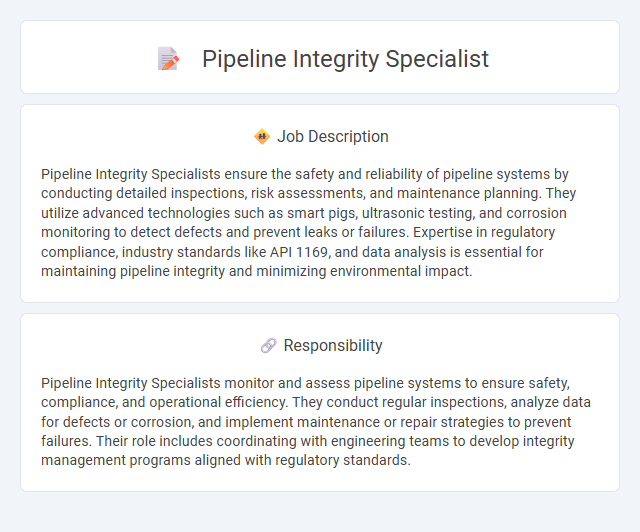
Pipeline Integrity Specialists ensure the safety and reliability of pipeline systems by conducting detailed inspections, risk assessments, and maintenance planning. They utilize advanced technologies such as smart pigs, ultrasonic testing, and corrosion monitoring to detect defects and prevent leaks or failures. Expertise in regulatory compliance, industry standards like API 1169, and data analysis is essential for maintaining pipeline integrity and minimizing environmental impact.
Individuals with strong analytical skills and attention to detail will likely be well-suited for a Pipeline Integrity Specialist role, as it involves assessing pipeline conditions and ensuring safety standards. Those comfortable working in high-pressure environments and managing complex data may find this job aligns with their abilities. Conversely, people who struggle with technical tasks or lack patience for meticulous inspections might find the position challenging.
Qualification
A Pipeline Integrity Specialist must possess a strong background in engineering disciplines such as mechanical, civil, or materials engineering, often supported by a relevant bachelor's degree. Proficiency in pipeline inspection technologies, corrosion control methods, and regulatory compliance standards like API 1169, ASME B31.8, and PHMSA regulations is essential. Certification in pipeline integrity management and experience with risk assessment tools, damage prevention techniques, and data analysis software further enhance qualifications for this role.
Responsibility
Pipeline Integrity Specialists monitor and assess pipeline systems to ensure safety, compliance, and operational efficiency. They conduct regular inspections, analyze data for defects or corrosion, and implement maintenance or repair strategies to prevent failures. Their role includes coordinating with engineering teams to develop integrity management programs aligned with regulatory standards.
Benefit
Working as a Pipeline Integrity Specialist likely offers significant benefits such as ensuring the safety and reliability of critical infrastructure, which can lead to a strong sense of professional fulfillment. The role probably provides opportunities for career advancement and specialization within the energy or utility sectors. Competitive compensation and benefits packages may also be common, reflecting the technical expertise and responsibility involved.
Challenge
Pipeline Integrity Specialists likely face the challenge of detecting and addressing corrosion, cracks, and other potential hazards within complex pipeline networks. The role probably requires balancing rigorous safety standards with operational efficiency to prevent failures and environmental damage. Managing evolving regulations and integrating advanced inspection technologies could further complicate the maintenance of pipeline integrity.
Career Advancement
Pipeline Integrity Specialists play a critical role in ensuring the safety and reliability of pipeline infrastructure by conducting inspections, analyzing data, and implementing maintenance strategies. Career advancement in this field often leads to senior engineering roles, project management positions, or specialized consultant opportunities, supported by certifications such as NACE CIP or API 1169. Gaining expertise in risk assessment software, industry regulations, and advanced nondestructive testing techniques enhances promotion potential and salary growth.
 kuljobs.com
kuljobs.com